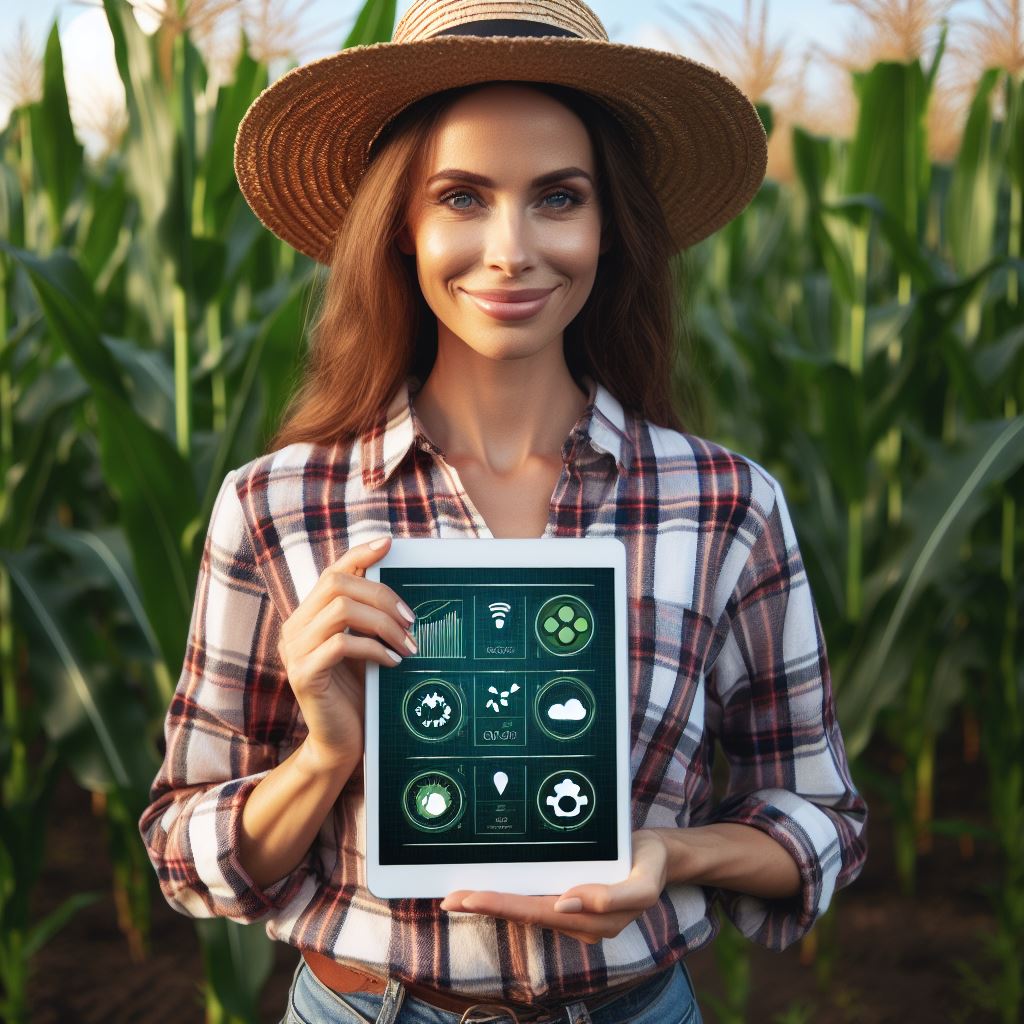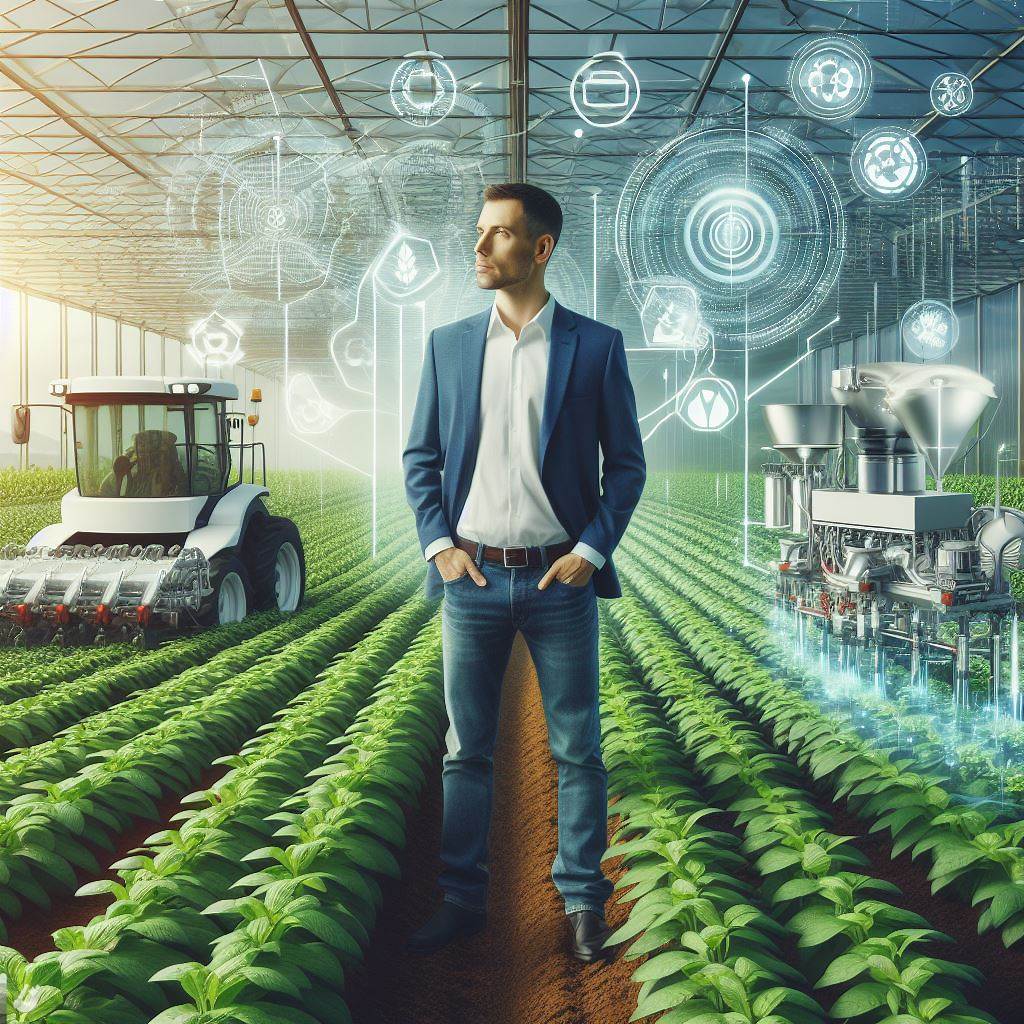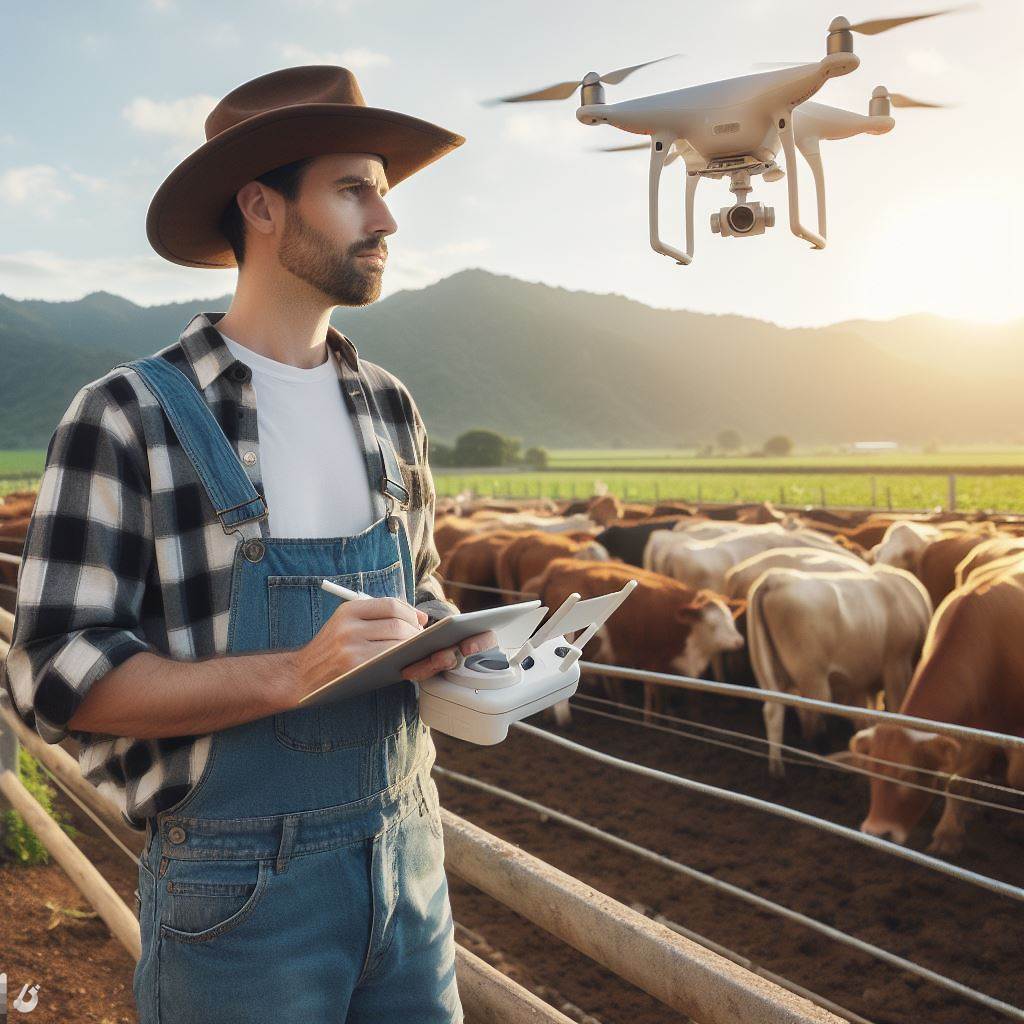Introduction
Livestock management is crucial in agriculture as it ensures the proper care and productivity of animals.
Agri-tech plays a significant role in enhancing livestock management practices.
Livestock management is vital in agriculture as it affects the overall productivity and profitability of the industry.
Proper management ensures the well-being, health, and efficient utilization of livestock resources.
Agri-tech refers to the application of modern technology in agriculture to improve farming practices.
In livestock management, agri-tech utilizes various digital tools, sensors, and data analysis to optimize animal health, productivity, and overall performance.
One of the key areas where agri-tech plays a significant role is in the monitoring and tracking of livestock.
Through the use of sensors and GPS technology, livestock farmers can keep track of the animals’ location, behavior, and health parameters.
This enables early detection of any issues and timely intervention.
Agri-tech also aids in improving feed efficiency and nutrition management.
Smart feeding systems leverage data analysis and algorithms to optimize feed composition and delivery, ensuring that animals receive the right nutrients at the right time.
This not only improves animal performance but also reduces feed waste and environmental impact.
Agri-tech enables better disease management and biosecurity measures.
Automated monitoring systems can detect signs of illness or infection, allowing early detection and prompt treatment.
Technology facilitates contact tracing and data sharing, helping prevent the spread of diseases among livestock populations.
Transform Your Agribusiness
Unlock your farm's potential with expert advice tailored to your needs. Get actionable steps that drive real results.
Get StartedIn short, livestock management plays a vital role in agriculture, and with the advent of agri-tech, it is witnessing significant improvements.
The use of technology in monitoring, nutrition management, and disease control enhances overall productivity, welfare, and sustainability in the livestock industry.
History of Agri-Tech in Livestock Management
Overview of the early developments in agri-tech for livestock management
- Early developments in agri-tech for livestock management can be traced back to ancient civilizations.
- In ancient Egypt, for instance, the use of irrigation systems helped enhance livestock farming efficiency.
- As time went on, technological advancements continued to shape the field of livestock management.
- In the 18th century, the Industrial Revolution brought about significant changes in agriculture, including livestock management.
- New machinery, such as steam-powered engines, transformed the way livestock was bred, fed, and cared for.
- The introduction of selective breeding techniques allowed farmers to improve the genetics and productivity of their livestock.
- Livestock management further evolved with the implementation of early veterinary practices.
Advancements in Agri-Tech for Livestock Management
- In recent years, advancements in agri-tech have revolutionized livestock management practices.
- One area that has seen significant progress is the use of sensors and monitoring devices.
- These technologies enable real-time monitoring of animals, helping farmers track their health and behavior.
- Remote monitoring systems have also become increasingly popular, allowing farmers to monitor livestock from anywhere.
- Artificial intelligence (AI) is another exciting development in agri-tech for livestock management.
- AI algorithms can analyze vast amounts of data and provide actionable insights for optimized livestock management.
- Automated feeding systems have greatly improved efficiency and reduced labor requirements on livestock farms.
- By utilizing robotics, farmers can automate various tasks such as cleaning, milking, and even surgeries.
Notable Agri-Tech Solutions in Livestock Management
- One notable agri-tech solution is the use of wearable devices on livestock.
- These devices can monitor vital signs, detect diseases, and even track the location of individual animals.
- Smart fences equipped with GPS technology provide effective containment and prevent livestock from wandering.
- Advanced imaging techniques, such as ultrasound, help farmers assess the reproductive health of their livestock.
- Genomic technologies allow for DNA testing, aiding in the identification of genetic traits and disease resistance.
- Precision nutrition systems provide tailored diets based on individual animal requirements for optimal health and productivity.
- Agri-tech also encompasses the use of drones in livestock management.
- Drones can survey vast areas, monitor livestock, and even distribute feed and medications.
The history of agri-tech in livestock management has been a journey of continuous innovation.
From ancient agriculture practices to cutting-edge technologies, the field has come a long way.
The recent advancements in agri-tech have revolutionized how livestock is managed and optimized for productivity.
Notable solutions such as wearables, drones, and AI algorithms have transformed the industry.
As technology continues to evolve, we can expect further advancements in agri-tech for livestock management, leading to more efficient, sustainable, and profitable farming practices.
Read: Crop Monitoring Tech: Agri-Tech’s New Tools
Current Trends in Agri-Tech for Livestock Management
Agri-tech in livestock management has undergone significant advancements in recent years.
These developments have revolutionized the way farmers manage their livestock, leading to improved efficiency, productivity, and animal welfare.
In this section, we will explore some of the current trends in agri-tech for livestock management.
Precision Livestock Farming and its Impact on Efficiency and Productivity
- Precision livestock farming involves the use of technology to monitor individual animals or groups of animals.
- The use of sensors and monitoring devices allows farmers to track animal behavior, health, and performance.
- This data-driven approach enables farmers to identify and address health issues or nutritional deficiencies promptly.
- By monitoring individual animals, farmers can optimize their feeding strategies and improve overall efficiency within the farm.
- Precision livestock farming aids in early disease detection, reducing the need for antibiotics and improving animal welfare.
Integration of Sensor Technologies for Monitoring Animal Health and Behavior
- Sensor technologies such as RFID tags, accelerometers, and GPS trackers are increasingly being used in livestock management.
- RFID tags enable farmers to track individual animals, monitor their location, and record critical information such as vaccination history.
- Accelerometers can detect changes in animal behavior, indicating signs of distress, illness, or estrus.
- GPS trackers enable farmers to monitor grazing patterns, preventing overgrazing and allowing for better land management.
- Integrating sensor technologies with cloud-based platforms provides real-time data, helping farmers make informed decisions and act promptly.
Adoption of Data Analytics and Artificial Intelligence in Decision-Making Processes
- The collection and analysis of large datasets from livestock farms have become more manageable with the help of data analytics.
- Data analytics allows farmers to gain valuable insights into herd performance, production trends, and disease outbreaks.
- Artificial intelligence (AI) algorithms can process complex data and generate accurate predictions, aiding in disease prevention and optimizing breeding programs.
- AI-powered systems can automate tasks such as feeding, monitoring, and sorting livestock, saving both time and labor costs.
- Decision support systems powered by AI can assist farmers in making data-driven decisions, resulting in improved profitability and sustainability.
Overall, agri-tech innovations in livestock management have revolutionized the industry.
Precision livestock farming, integration of sensor technologies, and adoption of data analytics and AI have paved the way for more efficient, productive, and sustainable farming practices.
As technology continues to advance, we can expect further improvements in livestock management, leading to better animal welfare and increased profitability for farmers.
Read: Water-Saving Tech in Agriculture: Startups to Watch
Benefits of Agri-Tech in Livestock Management
Agri-tech, or agricultural technology, has revolutionized various industries, including livestock management.
By integrating advanced technologies into farming practices, farmers can optimize their operations and achieve better results.
In this blog section, we will explore the benefits of agri-tech in livestock management.
Improved Animal Welfare
One of the key advantages of agri-tech in livestock management is the ability to enhance animal welfare.
Through real-time monitoring systems, farmers can closely track their animals’ health, behavior, and overall well-being.
This enables early disease detection and prompt intervention, significantly reducing the risk of widespread outbreaks and minimizing animal suffering.
Increased Productivity and Efficiency
Agri-tech solutions have proven to be instrumental in boosting productivity and efficiency in feeding, breeding, and overall management processes.
Automated feeding systems, for instance, ensure proper nutrition and feed distribution, eliminating inconsistencies and improving animals’ growth rates.
Advanced breeding technologies, such as artificial insemination and genetic selection, enable farmers to produce healthier and more productive livestock.
Showcase Your Farming Business
Publish your professional farming services profile on our blog for a one-time fee of $200 and reach a dedicated audience of farmers and agribusiness owners.
Publish Your ProfileData-driven systems allow farmers to optimize their breeding strategies and make informed decisions based on genetic profiles and desired traits.
Furthermore, agri-tech tools enable precise and efficient management practices.
Automated systems for cleaning, waste disposal, and ventilation ensure optimal hygiene and comfort for the animals, promoting their well-being and productivity.
Reduction in Environmental Impact
- Livestock farming, if not managed sustainably, can have a significant environmental impact.
- Agri-tech has emerged as a crucial tool to address these concerns by optimizing resource usage and reducing waste.
- Through precision farming techniques, farmers can precisely measure and control inputs such as water, feed, and medication.
- This helps minimize waste and prevents the overuse of resources, resulting in substantial cost savings and a reduced environmental footprint.
- Agri-tech solutions aid in mitigating the negative effects of livestock farming on water and air quality.
- Advanced monitoring systems can detect and analyze potential pollutants, allowing farmers to take timely remedial actions.
- This ensures compliance with environmental regulations and contributes to the preservation of natural resources.
In a nutshell, agri-tech has revolutionized livestock management by offering numerous benefits to farmers and animals alike.
Improved animal welfare, increased productivity and efficiency, and a reduction in environmental impact are just a few of the advantages of adopting these technologies.
As technology continues to advance, the potential for further innovation in livestock management is vast.
By embracing agri-tech, farmers can enhance their operations, optimize resource utilization, and contribute to a more sustainable and profitable future for the livestock industry.
Read: Innovations in Livestock Comfort Control

Challenges and Limitations
Implementing agri-tech solutions for small-scale farmers can come with certain challenges and limitations that need to be addressed.
Below are some of the key issues:
Cost implications of implementing agri-tech solutions
One of the major challenges faced by small-scale farmers is the cost implications of adopting agri-tech solutions.
These technologies often require significant investments in terms of equipment, software, and training.
For many small-scale farmers with limited financial resources, the upfront cost of implementing agri-tech can be prohibitive.
They may not have the funds to purchase the necessary equipment or hire skilled personnel to operate and maintain it.
The cost of upgrading or replacing existing infrastructure to accommodate agri-tech solutions can also be a significant barrier.
Small-scale farmers may struggle to justify the expense when their existing systems are functioning adequately.
Technical barriers and the need for specialized knowledge and skills
The implementation of agri-tech solutions often requires specialized knowledge and skills that may not be readily available to small-scale farmers.
They may lack the technical expertise to understand and operate complex technologies.
The rapid pace of technological advancements means that farmers need to constantly update their skills to keep up with the latest developments.
This requires continuous training and learning, which can be a challenge for small-scale farmers who have limited access to educational resources.
The lack of reliable internet connectivity in rural areas can pose technical barriers to the adoption of agri-tech solutions.
Without a stable internet connection, farmers may not be able to access and utilize the full potential of these technologies.
Potential ethical concerns and issues related to privacy and data security
- As agri-tech involves the collection and analysis of data, potential ethical concerns and issues related to privacy and data security arise.
- Farmers may be hesitant to adopt these technologies due to concerns about how their data will be used and protected.
- There is a need to establish clear guidelines and regulations to ensure the responsible use and management of agricultural data.
- Farmers must be assured that their data will be confidential, not shared without consent, and used solely for improving farming practices.
- There is also the risk of data breaches and cyber-attacks, which can result in the loss or misuse of sensitive information.
- Small-scale farmers may not have the resources or expertise to protect their data adequately, making them more vulnerable to such threats.
- Addressing these ethical concerns and providing robust data security measures is crucial to gaining the trust and confidence of small-scale farmers in adopting agri-tech solutions.
In review, while agri-tech holds immense potential for improving livestock management, there are several challenges and limitations that need to be overcome.
The cost implications, technical barriers, and ethical concerns associated with implementing these solutions pose significant hurdles for small-scale farmers.
With targeted support, policy interventions, and collaboration between stakeholders, these challenges can be addressed, leading to more sustainable and efficient livestock management practices.
Read: Data-Driven Livestock Nutrition Plans
Opportunities for Future Innovation in Agri-Tech for Livestock Management
As the world population continues to grow, the importance of efficient and sustainable livestock management becomes increasingly crucial.
Agri-tech, a combination of agriculture and technology, is playing a significant role in transforming the way livestock is managed.
Here are some exciting opportunities for future innovation in agri-tech for livestock management:
Potential for robotics and automation in livestock handling and milking
The use of robotics and automation in livestock handling and milking processes offers several advantages.
These technologies can improve efficiency, reduce labor costs, and ensure the well-being of animals.
Automated systems can handle tasks such as cleaning, feeding, and even monitoring the health of livestock.
Robotic milking systems, for example, enable cows to be milked whenever they feel comfortable, resulting in happier and more productive animals.
Integration of blockchain technology for traceability and supply chain management
Blockchain technology provides an excellent opportunity for enhancing traceability and supply chain management in livestock production.
By creating an immutable and transparent record of every transaction and activity, blockchain enables consumers to verify the source and quality of the products they purchase.
This technology can be utilized to track the origin and journey of livestock from farm to fork, ensuring food safety and addressing concerns related to animal welfare.
Development of smart farming systems for personalized livestock management
- Smart farming systems powered by the Internet of Things (IoT) can revolutionize the way livestock is managed.
- By collecting data from various sensors and devices, these systems provide real-time information about the health, behavior, and nutrition of individual animals.
- This data allows farmers to make informed decisions regarding the management of their livestock, ensuring optimal productivity and animal welfare.
Basically, agri-tech presents exciting opportunities for future innovation in livestock management.
Robotics and automation can revolutionize handling and milking processes, while blockchain technology can enhance traceability and supply chain management.
Smart farming systems offer personalized insights into livestock management, leading to improved productivity and animal well-being.
The integration of these technologies is crucial for ensuring sustainable and efficient livestock management in the future.
Showcase Your Farming Business
Publish your professional farming services profile on our blog for a one-time fee of $200 and reach a dedicated audience of farmers and agribusiness owners.
Publish Your ProfileConclusion
The significance and influence of agri-tech in livestock management cannot be overstated.
It has revolutionized the way farmers operate by streamlining processes, improving efficiency, and maximizing productivity.
As we have explored in this blog post, agri-tech solutions like automated feeding systems, remote monitoring, and data analysis have proven to be game-changers in livestock management.
They have enabled farmers to optimize feeding regimes, detect diseases early, and make informed decisions regarding breeding and reproduction.
It is crucial for farmers to embrace these new trends and incorporate agri-tech solutions into their operations.
By doing so, they can not only enhance their productivity but also ensure the well-being of their animals and promote sustainable farming practices.
Looking ahead, the future prospects of agri-tech in improving livestock management are promising.
With advancements in artificial intelligence, robotics, and big data analytics, we can expect even more sophisticated solutions that will further optimize efficiency and animal welfare.
All in all, agri-tech is a powerful tool that holds immense potential for the agriculture industry, especially in livestock management.
By leveraging these technological advancements, farmers can achieve higher yields, reduce costs, and contribute to a more sustainable and efficient farming ecosystem.
It’s time to embrace the future and explore the myriad benefits that agri-tech can bring to livestock management.




